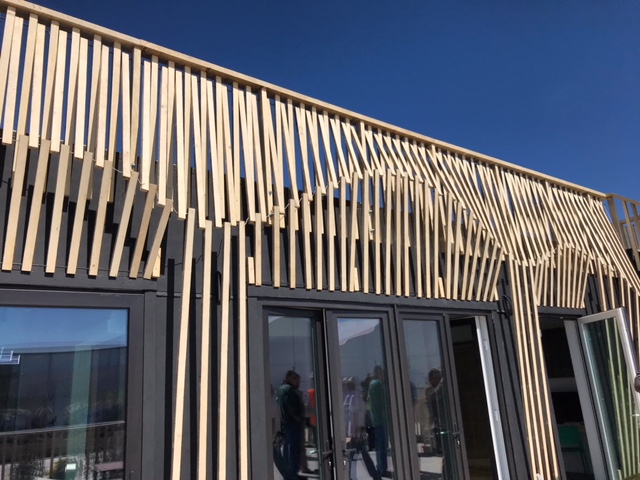
A temporary village has popped up not far from Denver International Airport. It's solar powered, with small houses created by college students from around the country, including the University of Denver.
Called the Solar Decathlon it's sponsored, in part, by the U.S. Department of Energy. This weekend, and next, you can tour these modular homes located at the 61st and Peña station on RTD's A Line.
The event began in 2002 as a showcase event to highlight the possibilities of solar energy in residential construction.
"Back then there really was very little solar installed in the United States," said Linda Silverman, director of the Solar Decathlon. "It really was about displaying solar and making people understand that they could live in a solar powered house."
Student teams compete in 10 contests, and their homes are judged on everything from water use and comfort, to architecture and marketability.

The University of Denver teamed up with the University of California, Berkley to build an 816-square-foot home they've named RISE. It was conceived by students in California, but actually built in Denver.
"Our house was really designed for a transitioning urban community," said Brenton Krieger, who represents Berkley. "As the community goes from more suburban to more of a city space, [the home] can go from a full family of four or five, to just a couple living here. So the spaces can turn into larger room."
The home has large sliding glass doors overlooking a deck, a kitchen, bathroom and two bedrooms with Murphy beds. Their walls can move on tracks in the wall to expand or compact the room. And, while most of the homes on display at the Solar Decathlon village are stand alone. RISE is stackable, creating small apartment buildings.
Silverman says the homes on display are not just thought experiments. Features from earlier competitions are now widely available, like smart thermostats.
"Back then, kids were creating these interactive displays that people could manipulate to understand their energy use. And we have several teams that have patents or have started companies because a lot of the smart home solutions are here," Silverman says.
Solar energy is booming right now, but there's uncertainty ahead. President Trump could soon place tariffs on Chinese-made panels coming to the United States. And that worries many in the industry, who say tariffs could drive up prices and drive down demand. Trump, however, says they'll help the industry. Silverman says the Decathlon, and solar energy remain an important part of the Department of Energy's mission.
"This administration is really committed to an 'all of the above' policy, and so they believe in all sorts of resources," Silverman said.








